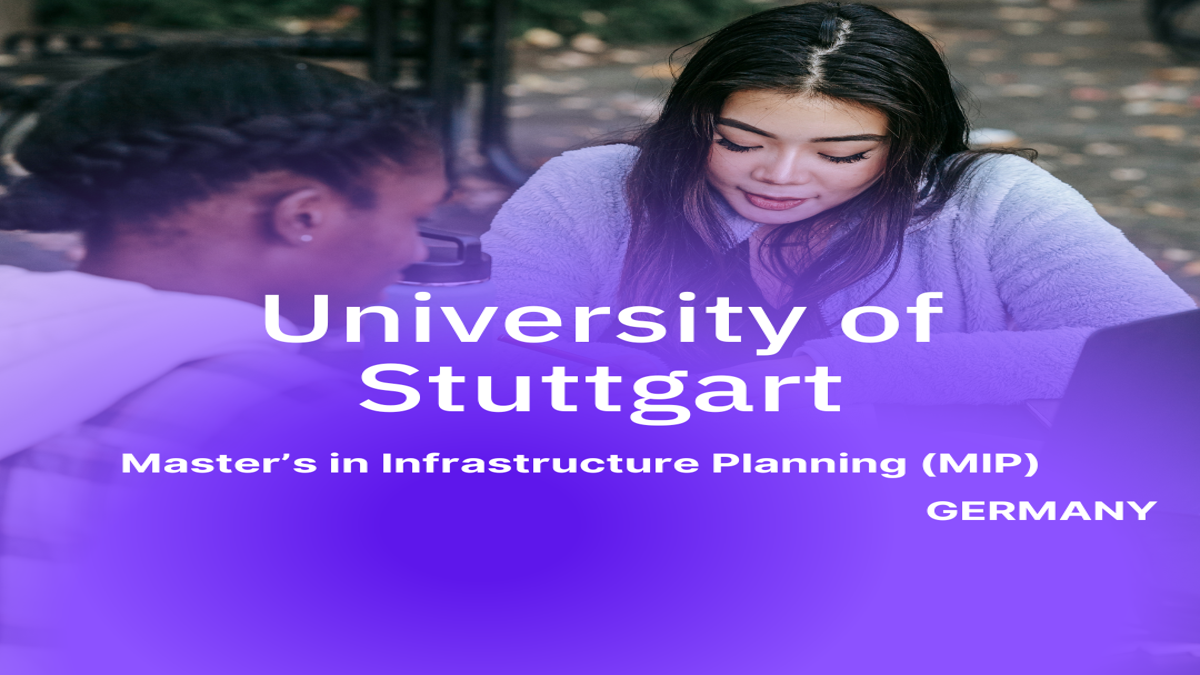A Complete Guide for International Students
The University of Stuttgart in Germany has the Master’s Program in Infrastructure Planning (MIP), widely regarded as one of the graduate programs of choice for future infrastructure specialists. Since 1983, the highly acclaimed program has educated professionals in sustainable development, urban planning, transport, water management, and policy-making. Taught in English, MIP appeals to engineers, architects, and planners from around the globe who seek to design global infrastructure systems.
About the Program
The two-year English-taught Master of Science (M.Sc.) program in Infrastructure Planning focuses on research-oriented learning and incorporates the most advanced scientific and engineering methods. Small class sizes of 35 students provide participants with direct interaction with distinguished professors, industry professionals, and global peers.
The program develops interdisciplinary competence and equips graduates to address multifaceted, large-scale infrastructure problems in international settings.
Curriculum Overview
The MIP curriculum integrates technical knowledge with economic, social, and environmental approaches. The core disciplines are:
- Urban and Regional Planning
- Transport Networks: Road and Rail
- Water and Waste Management
- Hydraulic Engineering and Energy Supply
- Economic, Ecological, and Social Dimensions of Planning
- Policy, Project Management, and International Development
Students learn to design, evaluate, and manage infrastructure projects taking into account sustainability, efficiency, and long-term effects.
Degree Details
- Degree Awarded: Master of Science (M.Sc.) in Infrastructure Planning
- Duration: 2 years (4 semesters)
- Language of Instruction: English
- Start Date: October annually (German language course in September)
Advantages of Pursuing Studies at Stuttgart
- Internationally accepted degree from a premier German university
- Multicultural and interdisciplinary learning environment
- Strong connections with Germany’s engineering and research network
- Career prospects globally in planning, consulting, development, and academia
Career Opportunities
Alumni of the program are employed in:
- International consulting companies
- Government ministries and urban development authorities
- NGOs and development banks
- Research institutions and universities
- Multinational project teams in infrastructure development
Costs and Funding
Four semesters estimated budget is approximately €34,000, including tuition, accommodation, insurance, and living expenses. Non-EU students have an additional €1,500 per semester tuition fee. For more details visit website
Scholarships and Funding Opportunities
The program does not offer direct scholarship provision. Students are, however, eligible to apply for several German and foreign funding sources, including:
- DAAD (German Academic Exchange Service)
- National Government Scholarships (e.g., CONACYT Mexico, COLFUTURO-DAAD Colombia)
- Political Foundations: Konrad-Adenauer-Stiftung, Friedrich-Ebert-Stiftung, Heinrich-Böll-Stiftung
- Religious Organizations: KAAD, EED
- International Programs: Erasmus Mundus, World Bank Graduate Scholarship
Eligibility Criteria
Applicants should fulfill the following criteria:
- Bachelor’s degree in Civil Engineering, Architecture, Urban Planning, or related fields
- Strong academic performance and relevant working experience
- English proficiency evidence (TOEFL/IELTS)
Full set of required documents (final transcripts, certificates, recommendation letters)
Application Process
- Application Portal: University of Stuttgart C@MPUS Portal
- Application Period: November 15 – February 15 every year
- Selection Process: Applications assessed in March; notification in April
- Pre-Semester Preparation: German course in September prior to commencement of classes in October
Conclusion
The Master’s in Infrastructure Planning (MIP) program at the University of Stuttgart is a perfect fit for future leaders in global infrastructure. Through world-class teaching staff, inter-disciplinary education, and access to Germany’s research and industry network, graduates are well-equipped to address urgent global challenges of infrastructure and sustainable development.
FAQs
1. How long is the MIP program?
The program is two years long, split into four semesters.
2. Is the program English-taught?
Yes, the whole program is taught in English.
3. Are there scholarships available for students of the University of Stuttgart’s MIP program?
Not directly from the university, but students can apply for DAAD and other grants.
4. What are the backgrounds eligible for admission?
Applicants should have a Bachelor’s degree in Civil Engineering, Architecture, Urban Planning, or related disciplines.
5. When is the annual application deadline?
The window for applications is open between November 15 and February 15.
6. Where do graduates work after completing the course?
Graduates work for consulting companies, government organizations, NGOs, research centers, and multinational project teams.
7. How much does the program cost?
The overall estimated total cost is €34,000 for four semesters covering living costs and tuition.




